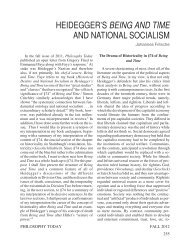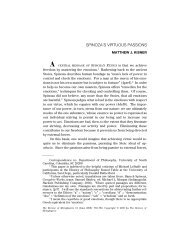Plato and the Written Quality of Philosophy. Interpretations of the ...
Plato and the Written Quality of Philosophy. Interpretations of the ...
Plato and the Written Quality of Philosophy. Interpretations of the ...
Create successful ePaper yourself
Turn your PDF publications into a flip-book with our unique Google optimized e-Paper software.
170 <strong>Philosophy</strong><br />
made out to be an "active" text which despite its indirect form <strong>of</strong> communication<br />
must still say everything that was important to <strong>Plato</strong>, so that in <strong>the</strong> style <strong>of</strong><br />
a "petitio principii" <strong>the</strong> historical existence <strong>of</strong> an oral philosophy <strong>of</strong> <strong>Plato</strong> can<br />
be denied. Szlezak points out <strong>the</strong> numerous aporias <strong>and</strong> discrepancies which<br />
result from such an absolutization <strong>of</strong> <strong>the</strong> dialogue in <strong>the</strong> form <strong>of</strong> a "dialoguebook"<br />
<strong>and</strong> thus consciously or unconsciously cover over <strong>Plato</strong>'s radical<br />
scepticism as regards all that is written. Szlezak is right in opposing <strong>the</strong> urge,<br />
bordering on <strong>the</strong> absurd, to underst<strong>and</strong> <strong>Plato</strong>'s published texts as being totally<br />
ironical: <strong>the</strong> modern ironist, proceeding in a high-h<strong>and</strong>ed manner, consistently<br />
excludes from any underst<strong>and</strong>ing all readers who may possibly be<br />
capable <strong>of</strong> a more limited degree <strong>of</strong> irony: "The ironist is always right" (370).<br />
It was obviously not Szlezak's aim specifically to analyze in terms <strong>of</strong> its<br />
intrinsic philosophical value <strong>the</strong> material structure <strong>of</strong> <strong>the</strong> esoteric principles<br />
<strong>the</strong>ory, which critics see as being especially abstract; still, his work on <strong>the</strong><br />
dialogues - especially as regards this principles <strong>the</strong>ory - gives reason to hope<br />
that <strong>the</strong> "hostile camps" <strong>of</strong> "esotericists" <strong>and</strong> "anti-esotericists" will be able to<br />
attain if not a reconciliation, <strong>the</strong>n at least a new insight, in <strong>the</strong> light <strong>of</strong> which<br />
<strong>the</strong> "unwritten" in <strong>Plato</strong>'s thought may not be suppressed or reduced to<br />
supposedly insignificant, philosophically irrelevant trivialities without fur<strong>the</strong>r<br />
ado.<br />
Pr<strong>of</strong>essor Dr. Werner Beierwaltes, Miinchen<br />
TRAUGOTT, EDGAR<br />
Certainty in Uncertainty<br />
["Sicherheit im Ungewissen"]<br />
Zirndorf: Pauli-Balleis-Verlag, 1986; 195 pp.<br />
Edgar Traugott, from 1963 to 1977 editor-in-chief <strong>of</strong> <strong>the</strong> N umberger Zeitung,<br />
is not only an outst<strong>and</strong>ing diagnostician <strong>of</strong> <strong>the</strong> ills <strong>of</strong> his age <strong>and</strong> critic <strong>of</strong><br />
civilization, but a significant philosophical writer. This became clear at <strong>the</strong><br />
latest with <strong>the</strong> appearance <strong>of</strong> his book Die magnetische Weft ("The Magnetic<br />
World". (Heroldsberg: Glock & Lutz 1983), whose call for a 'revival <strong>of</strong><br />
thinking' is continued <strong>and</strong> intensified in <strong>the</strong> present volume. Traugott's is an<br />
independent mind <strong>and</strong> a brooding one; he is a loner, meditating outside all <strong>the</strong>.<br />
schools, ideologies <strong>and</strong> "isms". But this is not to say that he does not attach<br />
himself - in a productive sense - to certain traditions, or that he does not revive<br />
<strong>and</strong> fructify much that has already been thought. He can be fitted in nowhere.<br />
Nei<strong>the</strong>r in what he says nor in <strong>the</strong> way he says it can he be subsumed under<br />
traditional labels. He does not proceed systematically, draws up no plans for
















